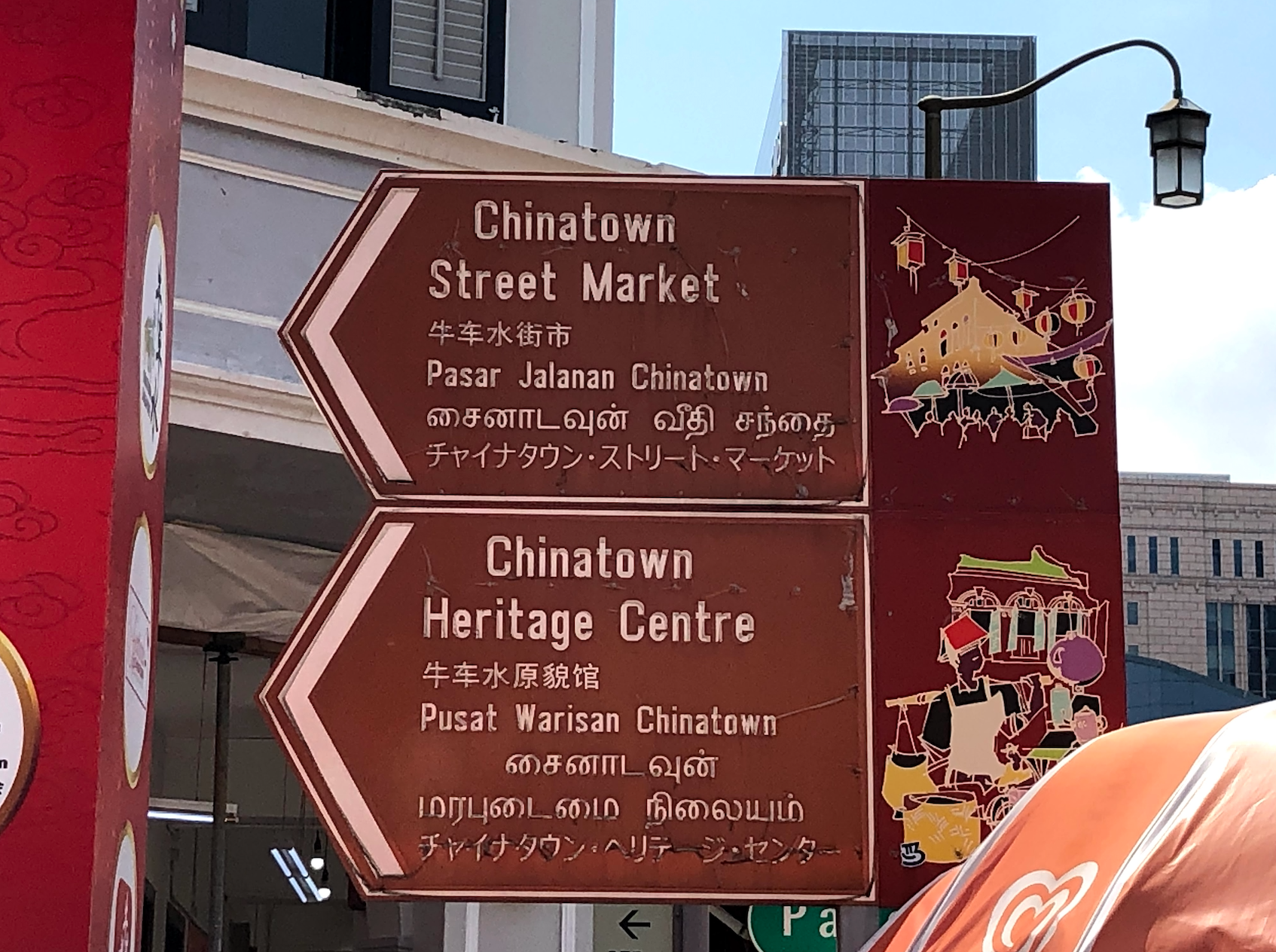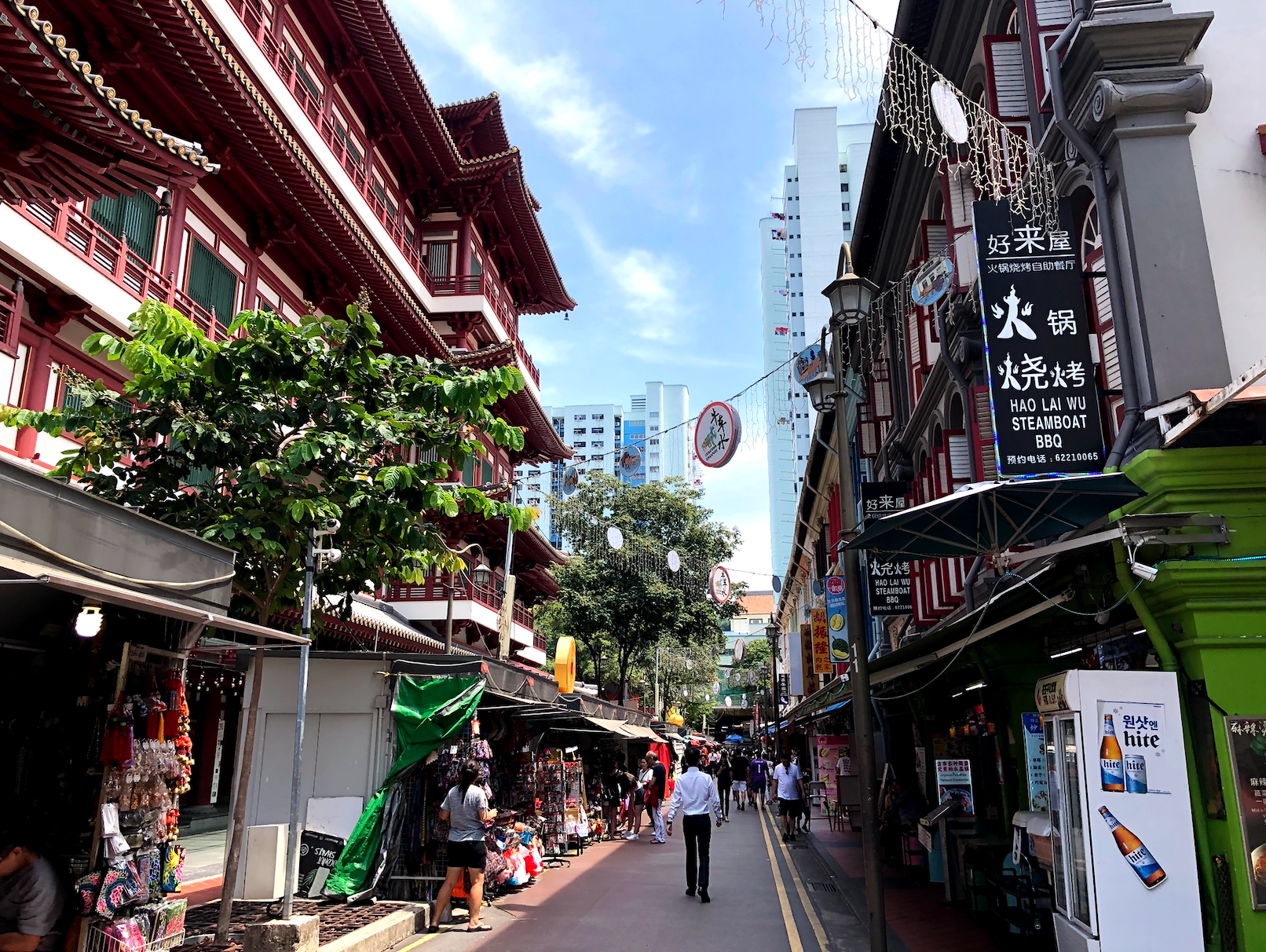Singapore is a tiny Southeast Asian country often celebrated for its diverse and multilingual population. Despite efforts to preserve its cultural heritage, the country is at risk of completely losing the speakers and history of its Chinese dialects.
A street in Singapore’s Chinatown showcasing the four official languages of the country. Courtesy of Rhiannon Koh.
Singapore is an island nation located on the tip of the Malay Peninsula. This city-state is an international port known for its cleanliness, law and order, and neo-futuristic cityscapes. Under its sleek veneer of lights, however, Singapore also harbors an impressive heritage thanks to its multicultural populace.
The official story of Singapore begins in the third century. Early Chinese records show that this island was frequented by the Malays, the Javanese, the Indian Cholas and other passing tradesmen. According to legend, the 14th-century Srivijayan prince Sri Tri Buana stumbled upon the island, saw a tiger, and mistook it for a lion. He then named the island “Singapura,” or the “Lion City.” After nearly five centuries of obscurity, the island resurged into the spotlight when the British statesman Stamford Raffles founded what is now considered modern-day Singapore. Even before Raffles’ influence, the island was already home to an ethnically diverse mix of Chinese, Malays and Indians.
Since its independence in 1965, Singapore has encoded multiculturalism and linguistic diversity into its constitution. Statute 153A states that Malay, Mandarin, Tamil and English shall be the four official languages in Singapore; no person shall be discriminated against for whichever they choose. Consequently, multilingual signs are considered the norm and it can cause a public uproar when signs fail to be inclusive. In recent years, however, English has dominated communication in many homes.
Singapore’s city plan emphasizes historical preservation, fostering an urbanscape of both old and new. Courtesy of Rhiannon Koh.
When Singapore’s first prime minister, Lee Kuan Yew, came to power, he believed that knowledge of dialects undermined the mastery of key languages. Since Singapore was a former British colony and was largely comprised of those of a Chinese background, Yew pushed for English and Mandarin education in schools, essentially cutting down a “thriving linguistic tropical rainforest.” Though these languages gave Singapore a competitive edge in global markets, many Singaporeans lost knowledge of their mother tongues—Hokkien, Teochew, Hakka and others—as well as their connection to grandparents and elders who spoke exclusively in those dialects. A 2015 Department of Statistics study found that in-home dialect use decreased from 18.2% in 2005 to 12.6%. In the wake of this reckoning, many youths are taking steps to reclaim their heritage. Students like Lee Xuan Jin came to understand that Hokkien and Teochew were his “true mother tongues” as opposed to mainland Mandarin. To rekindle the language and improve literacy, Lee launched a Facebook page called Writing in Hokkien.
Singapore’s Gardens by the Bay, a testament to the country’s endemic botany and the potential of its future. Courtesy of Rhiannon Koh.
In an op-ed piece for Rice, Natalie Tan questions Singapore’s Speak Mandarin Campaign—a program that effectively rendered dialects obsolete in favor of a unified but vague Chinese culture. Tan argues that Singaporeans lost a bridge to the past. If this trend continues, Singaporeans will lose their ability to translate interviews and other important historical documents. Locals will also lose the stories of their elders as well as the rich histories still bound up in fading languages.
The demise of Chinese dialects taps into the overarching issue of dying languages across the globe. Some feel the dissolution of language is inevitable, citing cultural differences in value and multicultural diversity. Others argue that dying languages should be saved, referencing the invaluable knowledge Indigenous languages harbor. Many languages disappear each year; the difficult question is whether anything should be done to prevent this fate.
Rhiannon Koh
earned her B.A. in Urban Studies & Planning from UC San Diego. Her honors thesis was a speculative fiction piece exploring the aspects of surveillance technology, climate change, and the future of urbanized humanity. She is committed to expanding the stories we tell.




